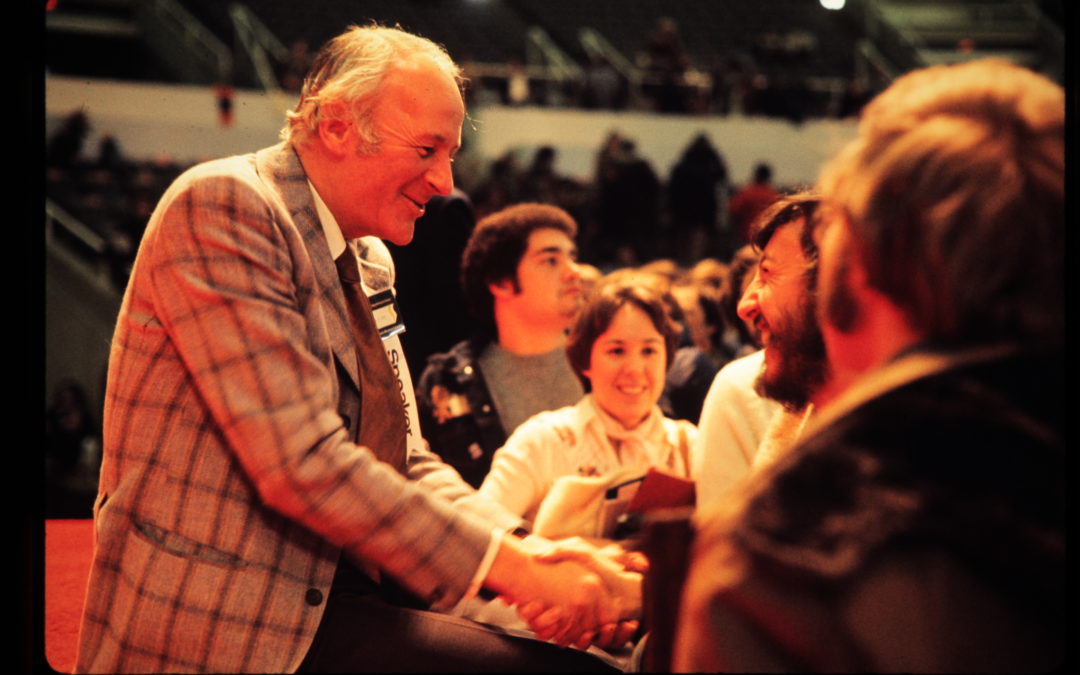The Ripple Effect of Uncle John
Tom Cooper
“So how does one become a study assistant to John Stott?” I was asked many times when first in London working with Uncle John.
“What was your answer?” he asked one day. I replied I had the option of two answers: One was that people applied from all over the world and I alone was the best candidate and so he selected me. The other answer was that I was the only one who applied for the job. He said, “Use the second answer.”
After our experience with John, Mark Labberton and I both returned to the Bay Area in California, We decided to start FATS (Former Assistants To Stott). When asked what the group did when it met, we answered, “We discuss how far we have all fallen short to the standards John set!“
My time with John was life-altering. The privilege of working with him and Frances was a rare gift that I treasure and also a responsibility I have carried for the rest of my life. He often called Frances, “omnicompetent, multi-functional, and indefatigable.” And she was! Make no mistake, the two of them together were a God-ordained team which rocked the church and engaged the secular world.
There are so many facets to this world-wide leader and visionary of the church. Let me share a few qualities that affected me and that I believe were some of the key principles that guided John.
First, he was empathetic to all who struggled. If you came to John with a problem and asked for prayer, he would start with the words, “Lord, we both have this problem.” This ability to open his heart to young people, people of color from different countries, and other denominations, allowed John to be a convenor and a bridge builder his entire life.
Second, he believed in transforming where he was instead of leaving. Many evangelicals encouraged John to leave the Anglican Church of England over various issues during his life. He stayed and attempted to change both the English and Worldwide Anglican Communion. His major impact was evidence that he made the right choice.
One of the key ways he did this was meeting with and encouraging younger seminarians with one on one meetings, group studies, and trips to The Hookses.
Third, John believed in the principle of “both-and, and not either-or”. Indeed, he said this to me yet again when I visited him a few years before he died. What he meant was, the option was not binary; it was not Evangelism or Social Justice or renewal of the local church or mission overseas, It was always to do both. His only filter for inclusion was the truth of scripture. He did not want us to hide in our own smaller subsets of our faith.
Fourth, John was committed to renewing the entire world church, or what he called the 2/3rds-world church. This meant that the gospel could not have just a white, European evangelical filter of what was biblical; voices and views from African, Asian, Latin American, Mideastern and other parts of the world were essential perspectives as well. He grew to learn from other cultures and other expressions of the Christian faith from the other parts or 2/3rds-world. His ecumenical desire to connect with the wider church included Catholics, Anglo-Catholics, Pentecostals and many other denominations that were different from his own. His vision was to empower and train local leaders through books and education to lead their own country’s theological movements, instead of being dependent on 1st-world education and educators.
Fifth, John believed that prayer and faith were inseparable from action and words. The twining of these two were evident in his writings, travels, and speaking.
Finally, John also had a delightful sense of humor. He loved to read the stories of Saki aloud, sometimes cracking up so hard he could hardly go on. He could laugh at himself and at good literature and with good friends.
One such story was from one of his first trips to the USA. At one church full of people, the person doing the introduction went interminably long, and included embarrassing phrases like, ”When I first read a book by John Stott, I said that I would crawl on my hands and knees for 500 miles to hear this man preach.“ A little way into his talk, John glanced over to where the man was sitting on the stage. He was fast asleep, and slept through John’s entire talk, When retelling the story, John would say, “I could only deduce that the long crawl had worn him out.”
John was a product of his age and heritage, yet by the grace of God he grew to engage a wider world both within and without the church. We have much to learn from both his character and passion as we apply our own God-given gifts to His glory as John did.
—Tom Cooper
(John’s Study Assistant, 1978-1980)
*Photo credit (top): InterVarsity Christian Fellowship
